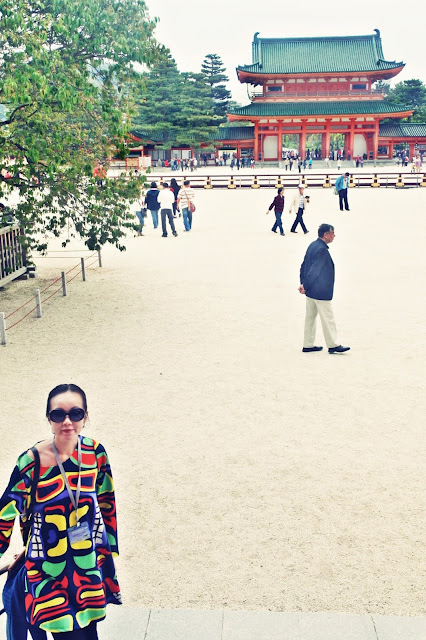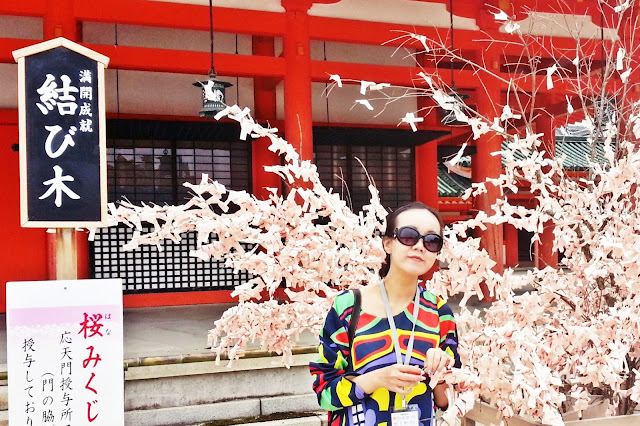Eyes fixed on brilliant vermillion contrast with green color, we quickly followed our guide to enter main gate of this historical and religious Heian Shrine...

Otenmon, the main entrance gate to Heian Shrine.


In 794 A.D Emperor Kanmu relocated the capital from Nara to a region far from
Buddhist influence to the present-day Kyoto, and named the new capital
Heian-kyo (平安京 = Capital of tranquility and peace).

Heian Jingu architectural style modeled on old Kyoto Imperial Palace.
It was built in 1895 to commemorate the 1100th anniversary
It was built in 1895 to commemorate the 1100th anniversary
of relocation the capital's foundation in Heian.
Heian Shrine is dedicated to deify spirits of first emperor (Emperor Kammu) and
last emperor (Emperor Komei) who reigned Heian-Kyo from 794 to 1185.
It's also symbolized revival of Kyoto.
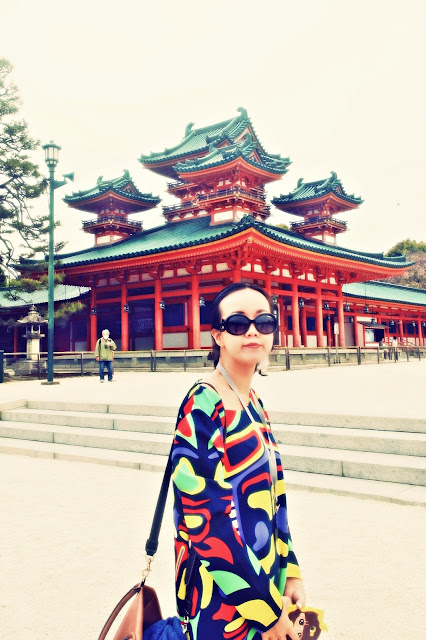
Although not listed as a World Heritage Site, this impressive
Shinto shrines is listed as an important cultural property of Japan.

It's also ranked as the top rank for shrines (Beppyou Jinja)
by the Association of Shinto Shrines.
Shinto shrines is listed as an important cultural property of Japan.

It's also ranked as the top rank for shrines (Beppyou Jinja)
by the Association of Shinto Shrines.
Purification Trough near the entrance.
You are supposed to clean your hands and mouth with the water
for purification before approaching the main hall.

Heian shrine was built in the style of Chodo-in, "Official Compound"
structure of the original palace with striking colors vermillion-white-green.
and interior hall with unpainted cypress wood (hinoki).

Sorry... no photography allowed inside the shrine hall.
You are supposed to clean your hands and mouth with the water
for purification before approaching the main hall.

Heian shrine was built in the style of Chodo-in, "Official Compound"
structure of the original palace with striking colors vermillion-white-green.
and interior hall with unpainted cypress wood (hinoki).
I think it's same like Gyeonggijeon Shrine in Jeonju Korea, the middle path is for Kami (gods or spirits of the Emperors). You have to climb up from the right stairs and go down from left stairs.

Sorry... no photography allowed inside the shrine hall.
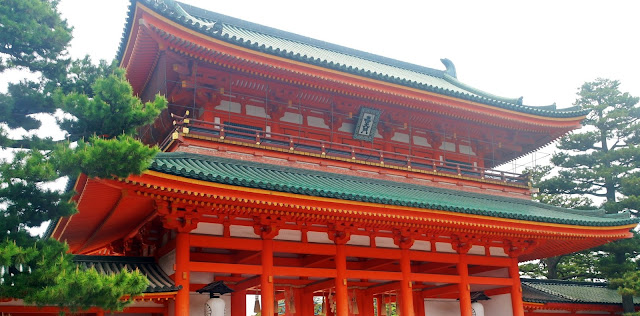
Main gate Otenmon has green-blue Chinese-style roof tiles.
 Two Chinese-style towers, Soryu-ro (Blue
Dragon) and Byakko-ro
Two Chinese-style towers, Soryu-ro (Blue
Dragon) and Byakko-ro
(White Tiger) stand at the end of the buildings.
It's painted in prominent vermillion (red-orange) color, which is believed
to ward off evil spirits and disease.

(White Tiger) stand at the end of the buildings.
Beautiful courtyards of Heian Shrine is covered with white sand.
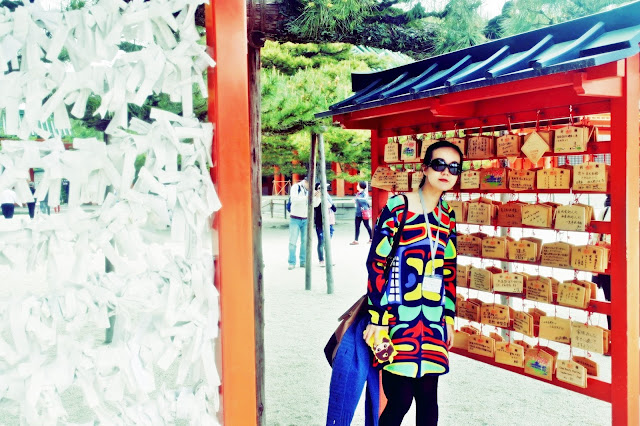
Ema and Omikuji.


Ema and Omikuji.

Similar to Kinkaku-ji Golden Pavilion, most of Shinto Shrines including Heian Shrine
has Ema stand for visitors write their wishes such as: good health, success in business,
wisdom, wealth or love on these wooden plates. Then, they leaved them at the shrine
in the hope that their wishes come true.
From far, I thought they were pretty pink Cheerry Blossom trees...
When I walked there, they turned out to be 'Omikuji' trees.
Omikuji are fortune telling paper slips found at many shrines and temples. Randomly drawn, they contain predictions ranging from daikichi ("great good luck") to daikyo ("great bad luck"). By tying the piece of paper around a tree's branch, good fortune will come true or bad fortune can be averted.
Enormous vermillion Torii spanning over the road.
Giant torii standing 24.2 meters tall, and the supporting beams are 3.63 meters in diameter marking the sacred ground of Heian Shrine.
Heian Jingu's Torii is one of the largest torii in Japan. Therefore, though it's standing quite far from the shrine, but when you walked out from the shrine, this bright vermillion Torii will obviously captured your eyes.
Heian Shrine (平安神宮)
Information:
Website: Heianjingu (Japanese)
Add: 左京区岡崎西天王町97 (97 Nishitenno-cho, Okazaki, Sakyo-ku)
Opening hours: 6:00 to 17:30
Admission: Free
Directions:
~ Subway: Karasuma Oike to Higashiyama Station (20 mins, 260 yen) + 10 mins walk to Shrine.
Related Posts:



